Abstract
In order to assess health care providers' training, perceptions, and practices regarding stress and health outcomes, a survey was administered to primary care providers in the outpatient medical clinics of a southeastern urban hospital serving a predominantly African-American indigent population. One-hundred-fifty-one of 210 providers (72%) responded. Forty-two percent of respondents reported receiving no instruction regarding stress and health outcomes during their medical/professional education. While 90% believed stress management was "very" or "somewhat" effective in improving health outcomes, 45% "rarely" or "never" discussed stress management with their patients. Respondents were twice as likely to believe that counseling patients about smoking, nutrition, or exercise was more important than counseling them about stress. Seventy-six percent lacked confidence in their ability to counsel patients about stress. The majority of respondents (57%) "rarely" or "never" practiced stress reduction techniques themselves. Belief in the importance of stress counseling, its effectiveness in improving health, and confidence in one's ability to teach relaxation techniques were all related to the probability that providers would counsel patients regarding stress. There is a need for curriculum reform that emphasizes new knowledge about stress and disease, new skills in stress reduction, and more positive beliefs about mind/body medicine and its integration into the existing health care structure.
Full text
PDF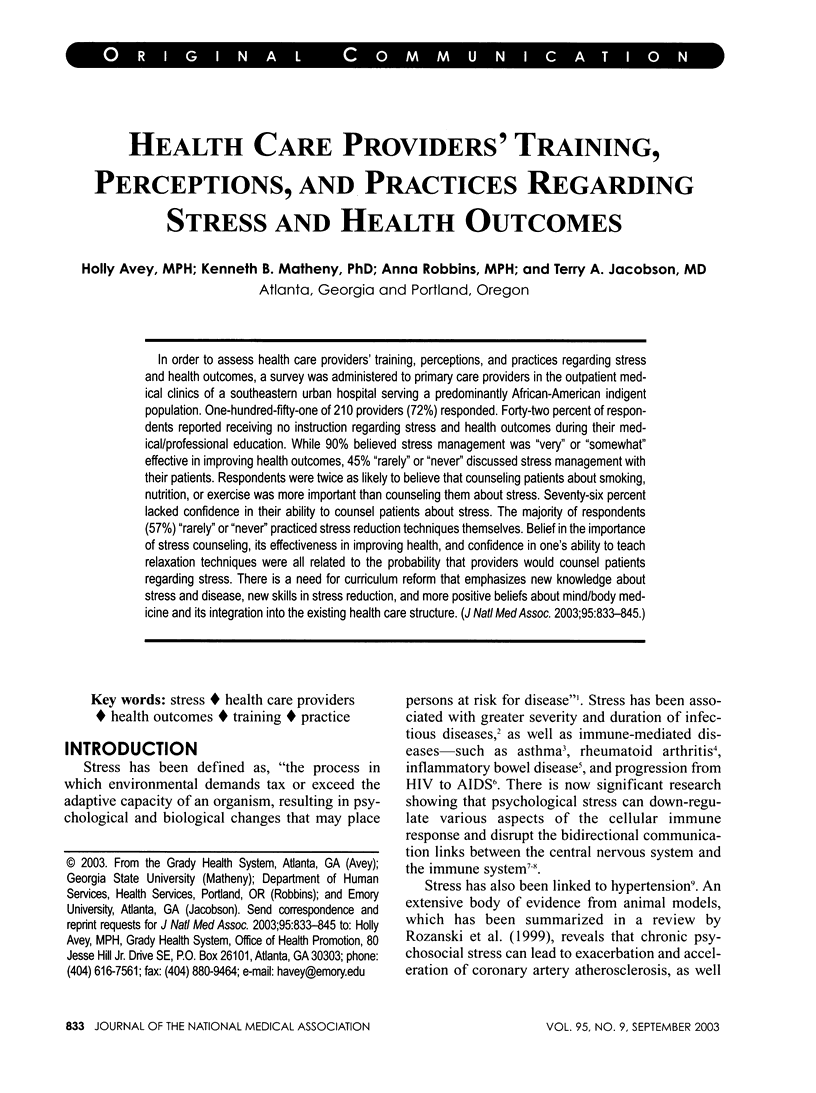
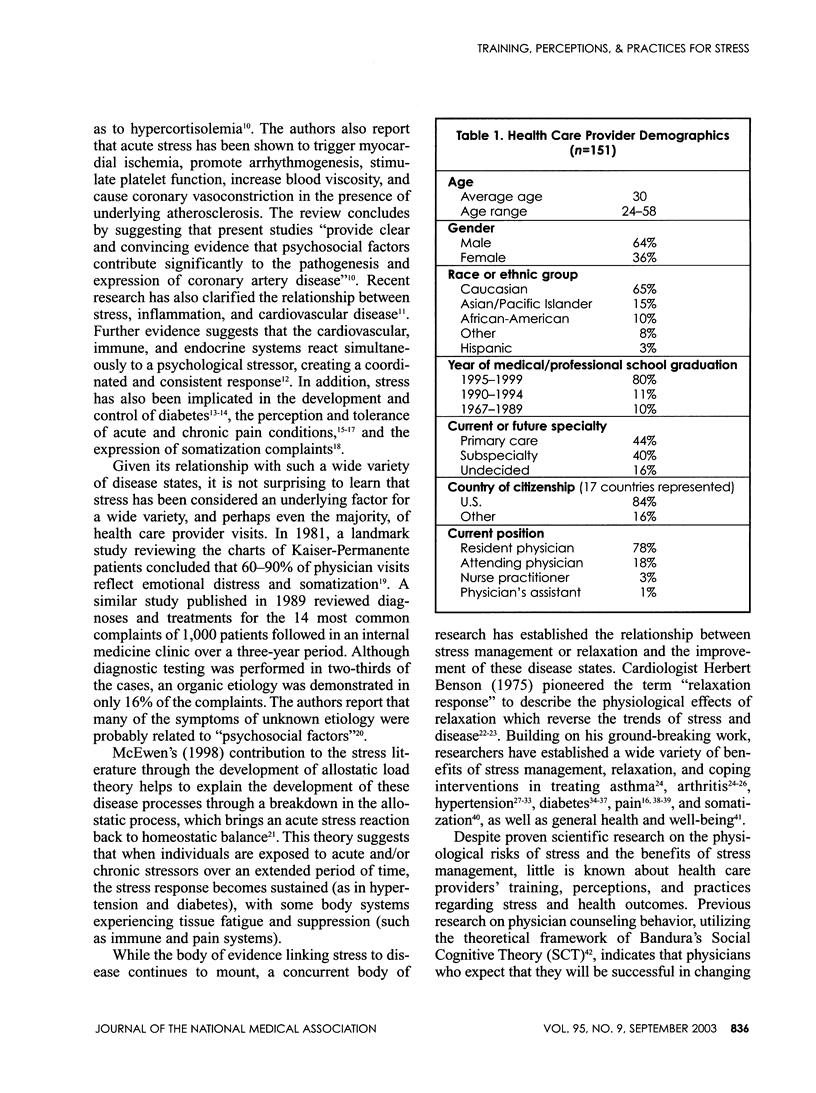
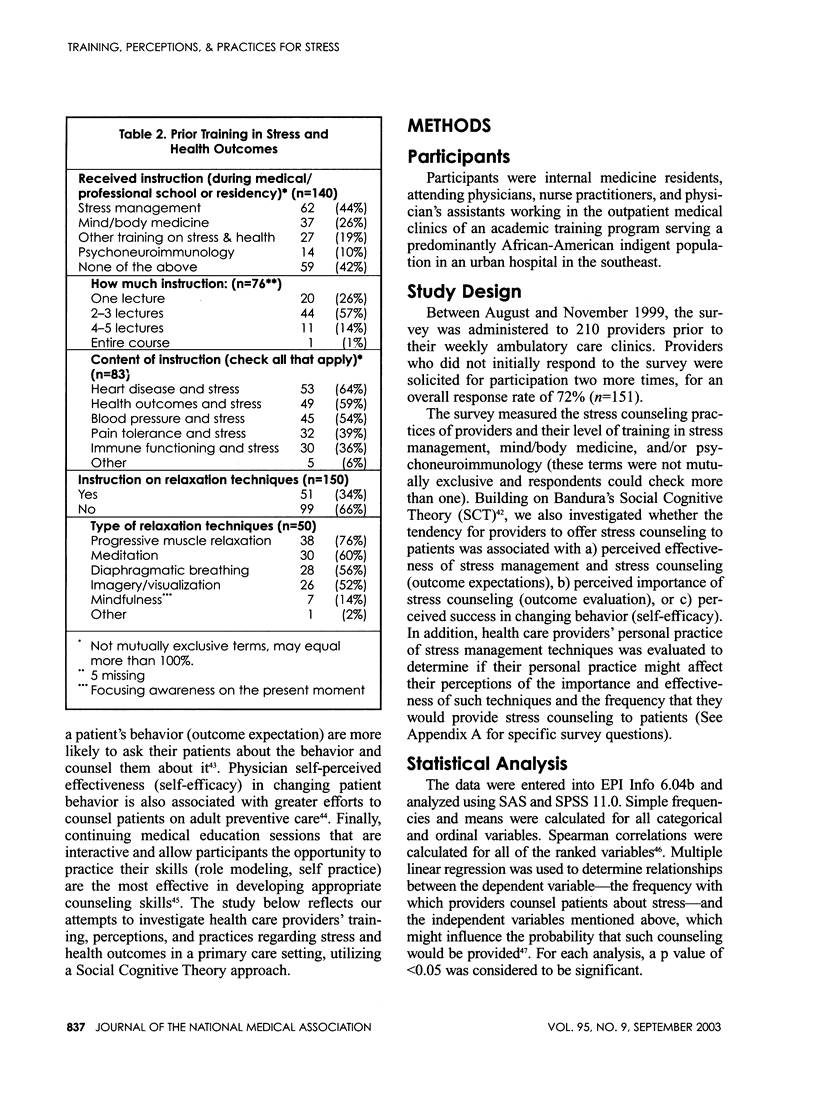
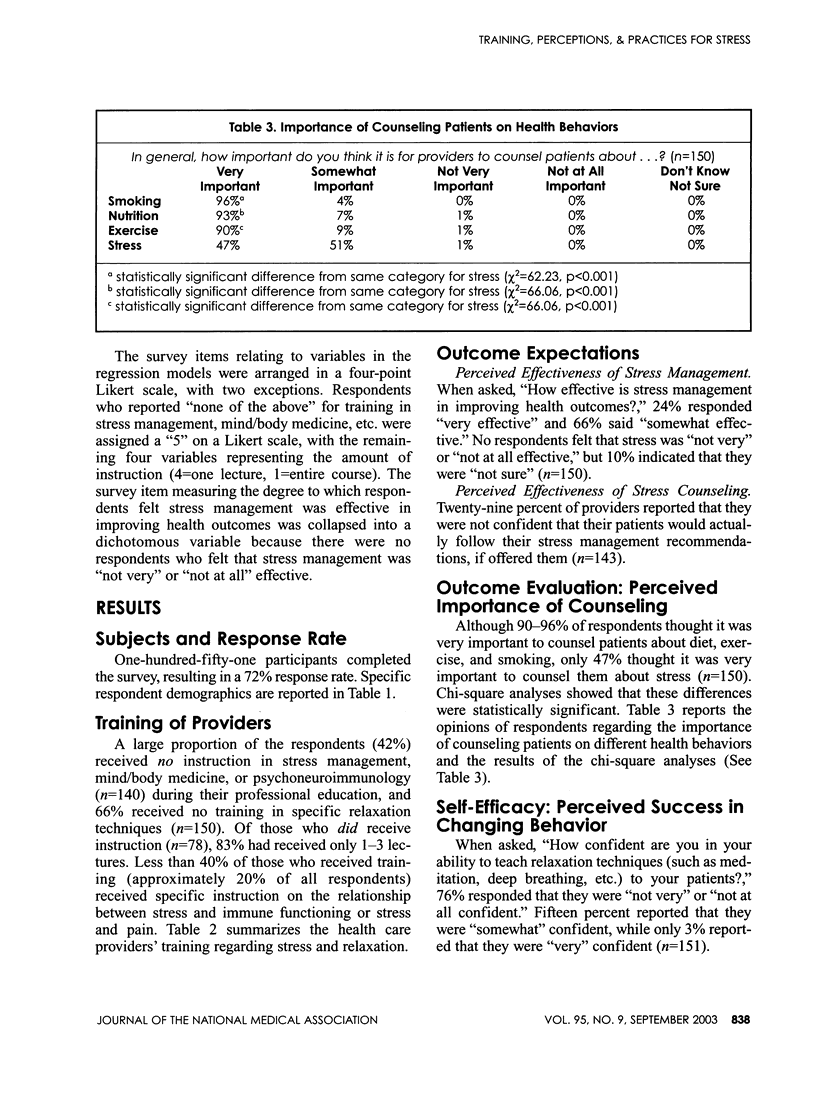
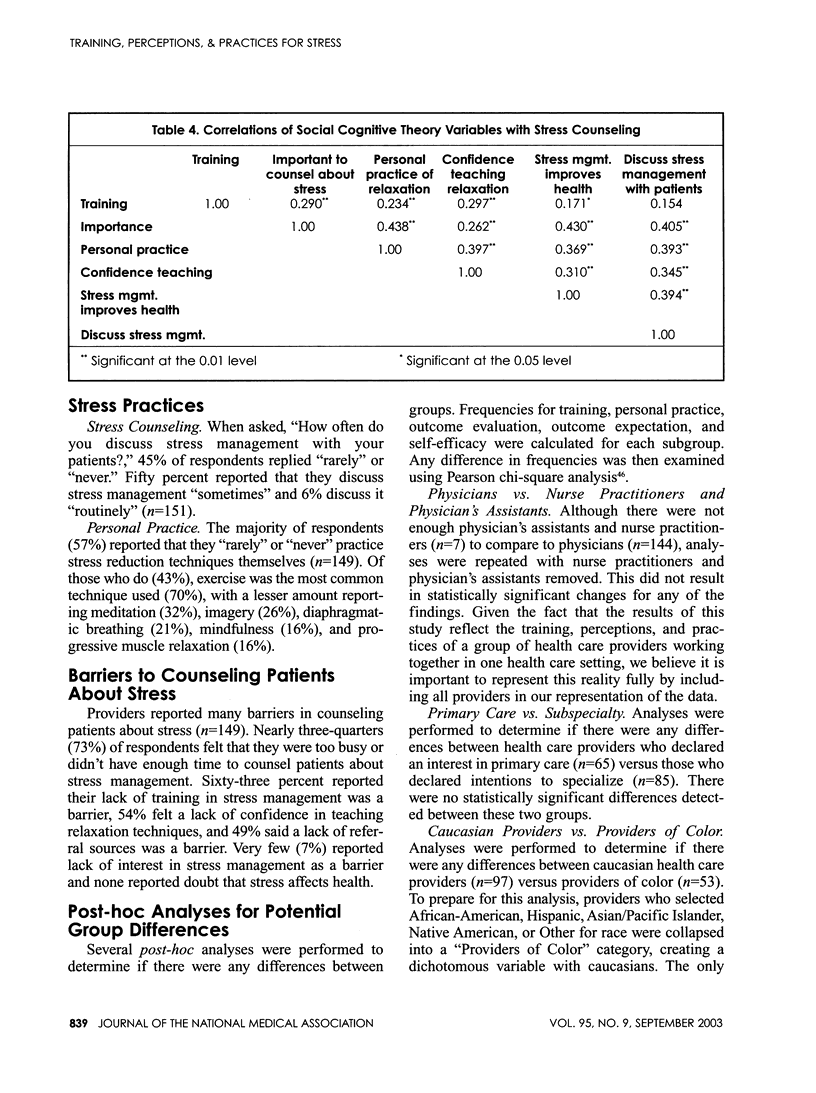
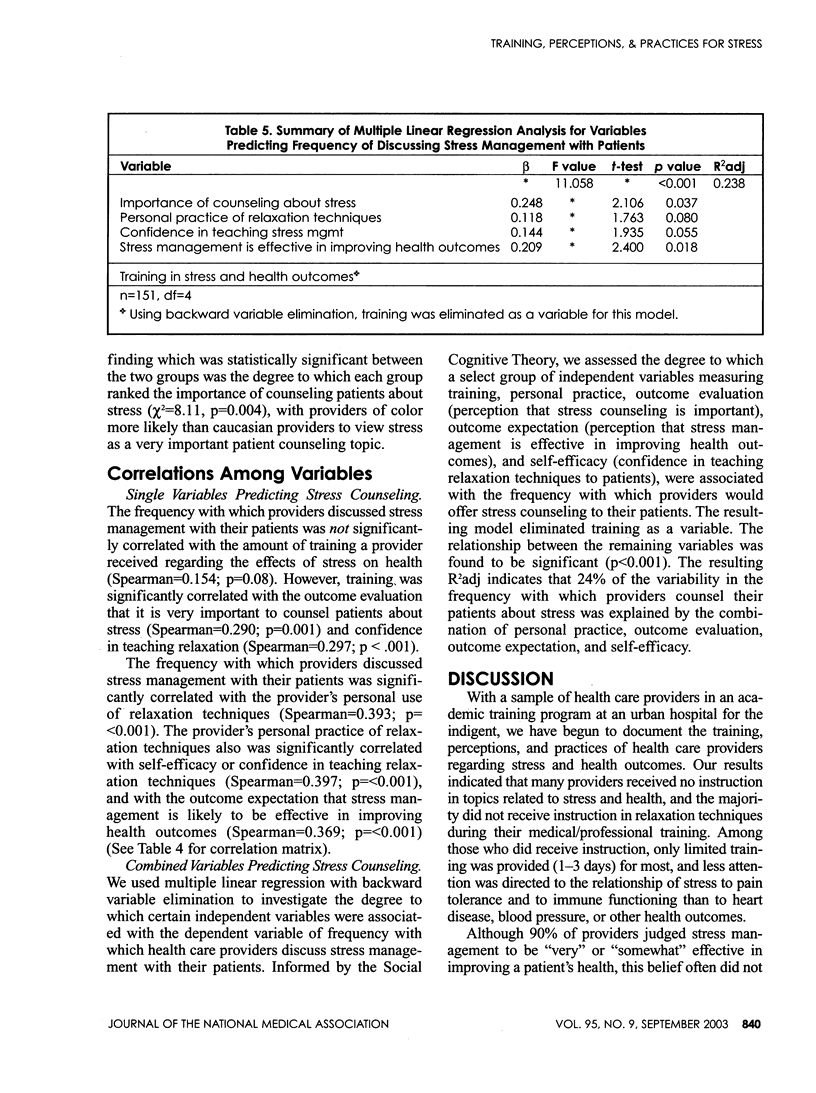
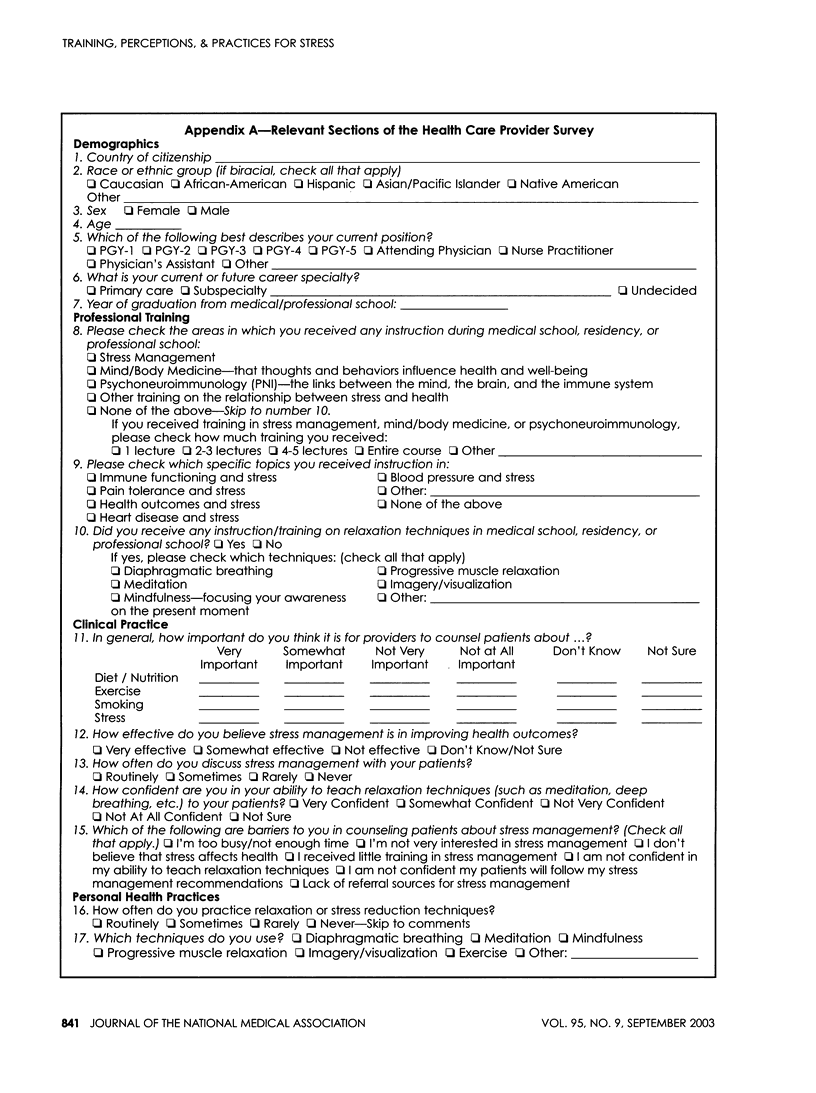
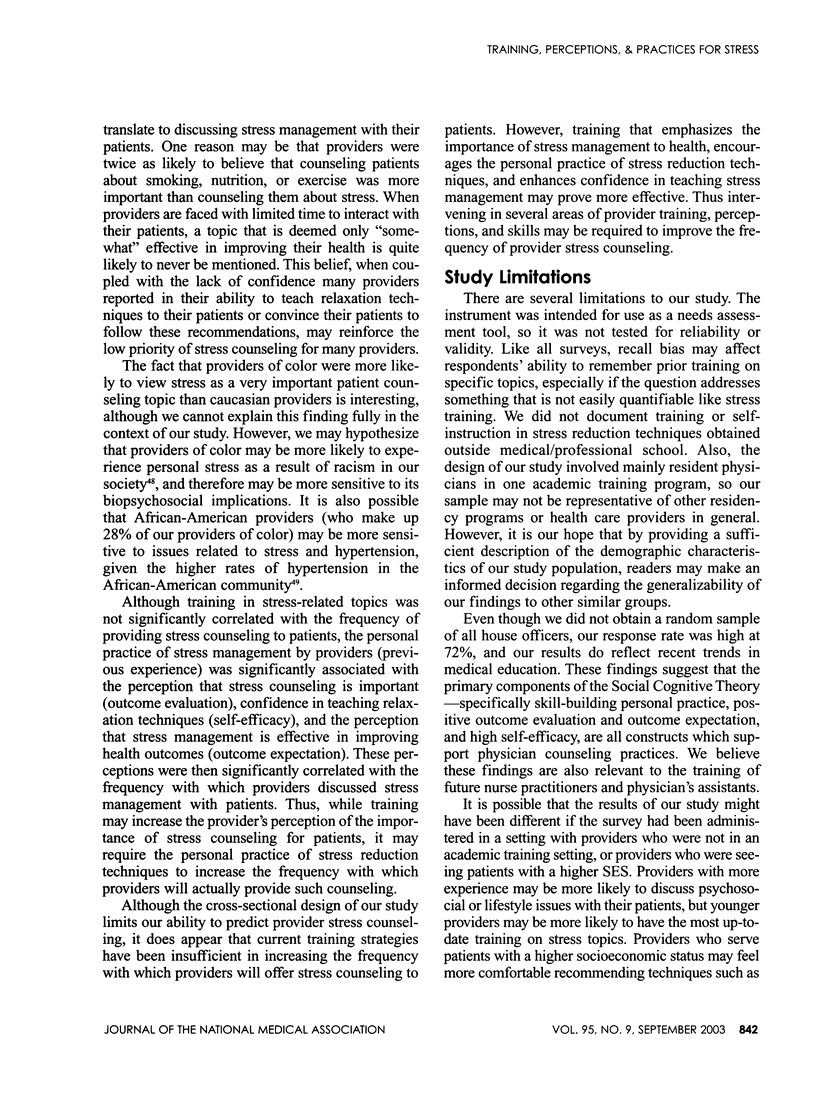
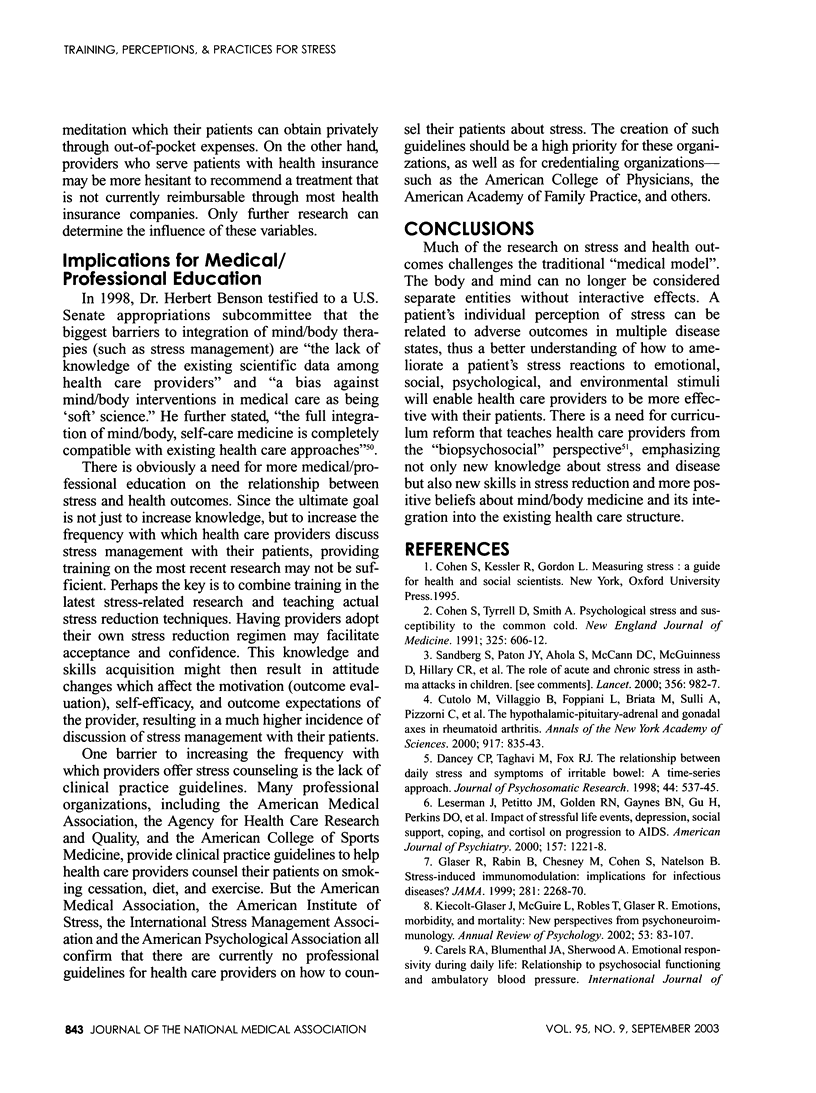
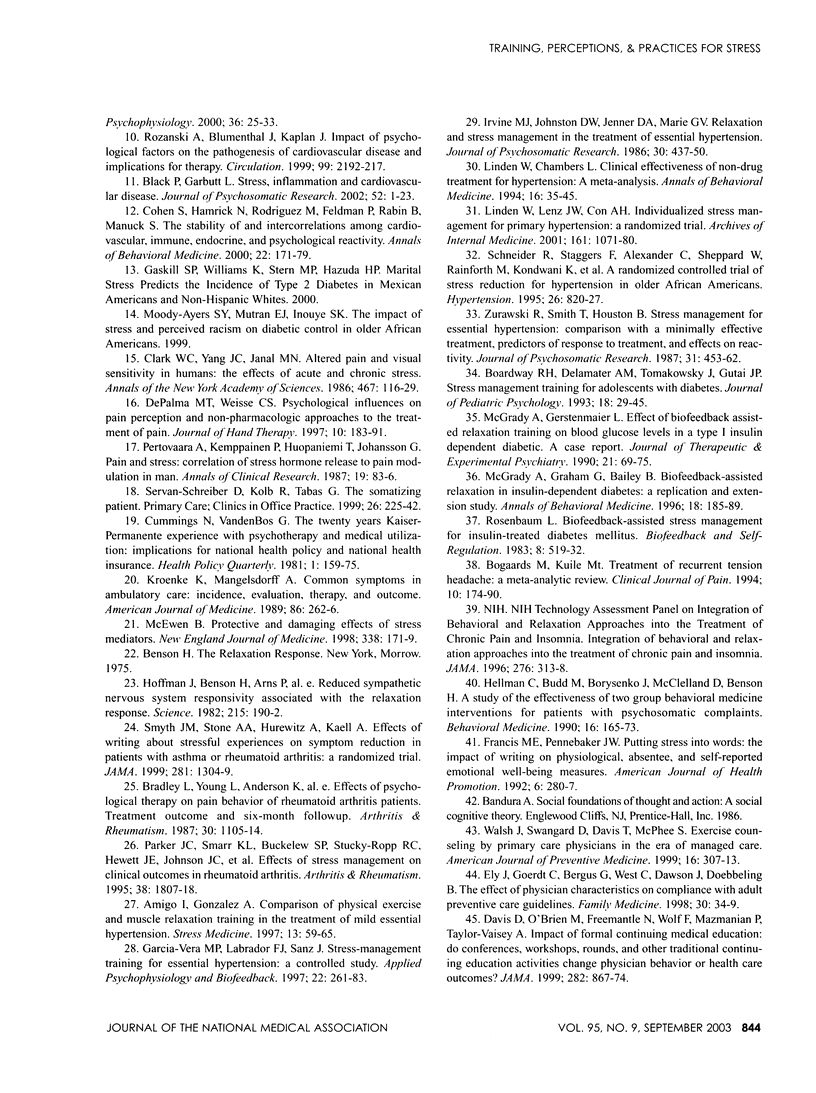
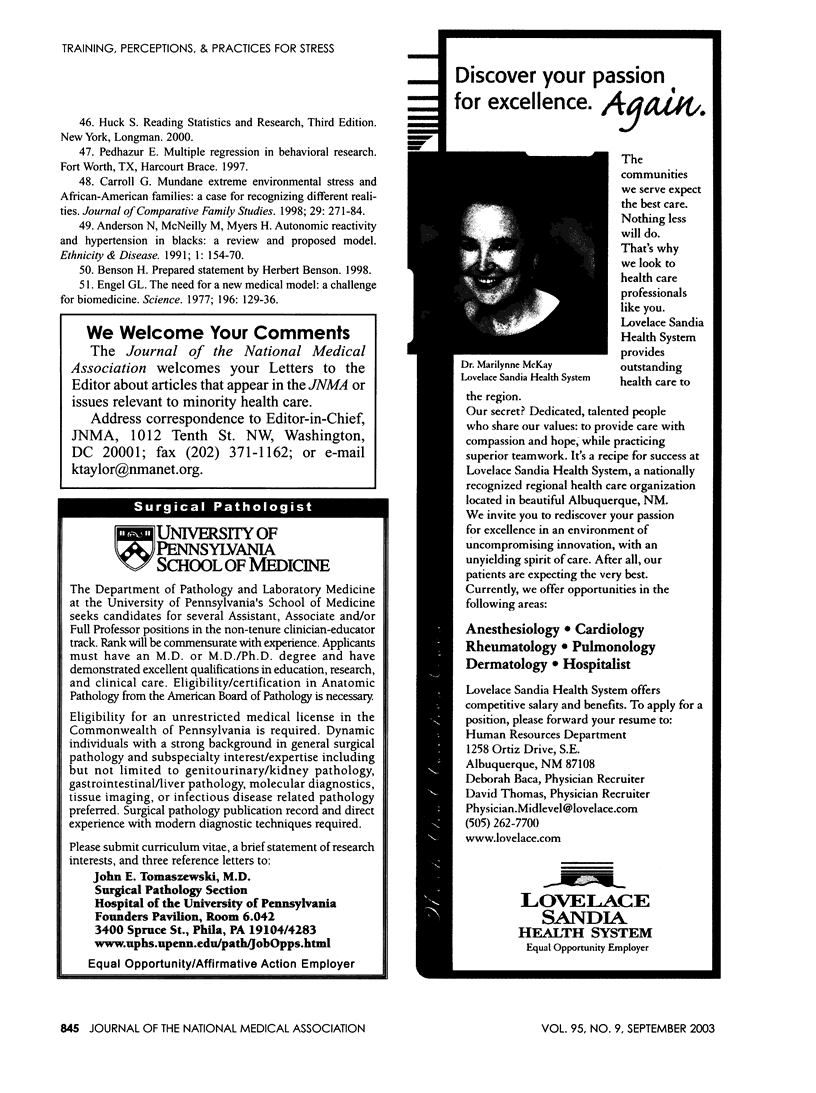
Selected References
These references are in PubMed. This may not be the complete list of references from this article.
- Anderson N. B., McNeilly M., Myers H. Autonomic reactivity and hypertension in blacks: a review and proposed model. Ethn Dis. 1991 Spring;1(2):154–170. [PubMed] [Google Scholar]
- Black Paul H., Garbutt Lisa D. Stress, inflammation and cardiovascular disease. J Psychosom Res. 2002 Jan;52(1):1–23. doi: 10.1016/s0022-3999(01)00302-6. [DOI] [PubMed] [Google Scholar]
- Boardway R. H., Delamater A. M., Tomakowsky J., Gutai J. P. Stress management training for adolescents with diabetes. J Pediatr Psychol. 1993 Feb;18(1):29–45. doi: 10.1093/jpepsy/18.1.29. [DOI] [PubMed] [Google Scholar]
- Bogaards M. C., ter Kuile M. M. Treatment of recurrent tension headache: a meta-analytic review. Clin J Pain. 1994 Sep;10(3):174–190. doi: 10.1097/00002508-199409000-00003. [DOI] [PubMed] [Google Scholar]
- Bradley L. A., Young L. D., Anderson K. O., Turner R. A., Agudelo C. A., McDaniel L. K., Pisko E. J., Semble E. L., Morgan T. M. Effects of psychological therapy on pain behavior of rheumatoid arthritis patients. Treatment outcome and six-month followup. Arthritis Rheum. 1987 Oct;30(10):1105–1114. doi: 10.1002/art.1780301004. [DOI] [PubMed] [Google Scholar]
- Clark W. C., Yang J. C., Janal M. N. Altered pain and visual sensitivity in humans: the effects of acute and chronic stress. Ann N Y Acad Sci. 1986;467:116–129. doi: 10.1111/j.1749-6632.1986.tb14623.x. [DOI] [PubMed] [Google Scholar]
- Cohen S., Hamrick N., Rodriguez M. S., Feldman P. J., Rabin B. S., Manuck S. B. The stability of and intercorrelations among cardiovascular, immune, endocrine, and psychological reactivity. Ann Behav Med. 2000 Summer;22(3):171–179. doi: 10.1007/BF02895111. [DOI] [PubMed] [Google Scholar]
- Cohen S., Tyrrell D. A., Smith A. P. Psychological stress and susceptibility to the common cold. N Engl J Med. 1991 Aug 29;325(9):606–612. doi: 10.1056/NEJM199108293250903. [DOI] [PubMed] [Google Scholar]
- Cummings N. A., VandenBos G. R. The twenty years Kaiser-Permanente experience with psychotherapy and medical utilization: implications for national health policy and national health insurance. Health Policy Q. 1981 Summer;1(2):159–175. [PubMed] [Google Scholar]
- Cutolo M., Villaggio B., Foppiani L., Briata M., Sulli A., Pizzorni C., Faelli F., Prete C., Felli L., Seriolo B. The hypothalamic-pituitary-adrenal and gonadal axes in rheumatoid arthritis. Ann N Y Acad Sci. 2000;917:835–843. doi: 10.1111/j.1749-6632.2000.tb05449.x. [DOI] [PubMed] [Google Scholar]
- Dancey C. P., Taghavi M., Fox R. J. The relationship between daily stress and symptoms of irritable bowel: a time-series approach. J Psychosom Res. 1998 May;44(5):537–545. doi: 10.1016/s0022-3999(97)00255-9. [DOI] [PubMed] [Google Scholar]
- Davis D., O'Brien M. A., Freemantle N., Wolf F. M., Mazmanian P., Taylor-Vaisey A. Impact of formal continuing medical education: do conferences, workshops, rounds, and other traditional continuing education activities change physician behavior or health care outcomes? JAMA. 1999 Sep 1;282(9):867–874. doi: 10.1001/jama.282.9.867. [DOI] [PubMed] [Google Scholar]
- DePalma M. T., Weisse C. S. Psychological influences on pain perception and non-pharmacologic approaches to the treatment of pain. J Hand Ther. 1997 Apr-Jun;10(2):183–191. doi: 10.1016/s0894-1130(97)80072-5. [DOI] [PubMed] [Google Scholar]
- Ely J. W., Goerdt C. J., Bergus G. R., West C. P., Dawson J. D., Doebbeling B. N. The effect of physician characteristics on compliance with adult preventive care guidelines. Fam Med. 1998 Jan;30(1):34–39. [PubMed] [Google Scholar]
- Engel G. L. The need for a new medical model: a challenge for biomedicine. Science. 1977 Apr 8;196(4286):129–136. doi: 10.1126/science.847460. [DOI] [PubMed] [Google Scholar]
- Francis M. E., Pennebaker J. W. Putting stress into words: the impact of writing on physiological, absentee, and self-reported emotional well-being measures. Am J Health Promot. 1992 Mar-Apr;6(4):280–287. doi: 10.4278/0890-1171-6.4.280. [DOI] [PubMed] [Google Scholar]
- García-Vera M. P., Labrador F. J., Sanz J. Stress-management training for essential hypertension: a controlled study. Appl Psychophysiol Biofeedback. 1997 Dec;22(4):261–283. doi: 10.1007/BF02438980. [DOI] [PubMed] [Google Scholar]
- Glaser R., Rabin B., Chesney M., Cohen S., Natelson B. Stress-induced immunomodulation: implications for infectious diseases? JAMA. 1999 Jun 23;281(24):2268–2270. doi: 10.1001/jama.281.24.2268. [DOI] [PubMed] [Google Scholar]
- Hellman C. J., Budd M., Borysenko J., McClelland D. C., Benson H. A study of the effectiveness of two group behavioral medicine interventions for patients with psychosomatic complaints. Behav Med. 1990 Winter;16(4):165–173. doi: 10.1080/08964289.1990.9934605. [DOI] [PubMed] [Google Scholar]
- Hoffman J. W., Benson H., Arns P. A., Stainbrook G. L., Landsberg G. L., Young J. B., Gill A. Reduced sympathetic nervous system responsivity associated with the relaxation response. Science. 1982 Jan 8;215(4529):190–192. doi: 10.1126/science.7031901. [DOI] [PubMed] [Google Scholar]
- Irvine M. J., Johnston D. W., Jenner D. A., Marie G. V. Relaxation and stress management in the treatment of essential hypertension. J Psychosom Res. 1986;30(4):437–450. doi: 10.1016/0022-3999(86)90083-8. [DOI] [PubMed] [Google Scholar]
- Kiecolt-Glaser Janice K., McGuire Lynanne, Robles Theodore F., Glaser Ronald. Emotions, morbidity, and mortality: new perspectives from psychoneuroimmunology. Annu Rev Psychol. 2002;53:83–107. doi: 10.1146/annurev.psych.53.100901.135217. [DOI] [PubMed] [Google Scholar]
- Kroenke K., Mangelsdorff A. D. Common symptoms in ambulatory care: incidence, evaluation, therapy, and outcome. Am J Med. 1989 Mar;86(3):262–266. doi: 10.1016/0002-9343(89)90293-3. [DOI] [PubMed] [Google Scholar]
- Leserman J., Petitto J. M., Golden R. N., Gaynes B. N., Gu H., Perkins D. O., Silva S. G., Folds J. D., Evans D. L. Impact of stressful life events, depression, social support, coping, and cortisol on progression to AIDS. Am J Psychiatry. 2000 Aug;157(8):1221–1228. doi: 10.1176/appi.ajp.157.8.1221. [DOI] [PubMed] [Google Scholar]
- Linden W., Lenz J. W., Con A. H. Individualized stress management for primary hypertension: a randomized trial. Arch Intern Med. 2001 Apr 23;161(8):1071–1080. doi: 10.1001/archinte.161.8.1071. [DOI] [PubMed] [Google Scholar]
- McEwen B. S. Protective and damaging effects of stress mediators. N Engl J Med. 1998 Jan 15;338(3):171–179. doi: 10.1056/NEJM199801153380307. [DOI] [PubMed] [Google Scholar]
- McGrady A., Gerstenmaier L. Effect of biofeedback assisted relaxation training on blood glucose levels in a type I insulin dependent diabetic. A case report. J Behav Ther Exp Psychiatry. 1990 Mar;21(1):69–75. doi: 10.1016/0005-7916(90)90051-l. [DOI] [PubMed] [Google Scholar]
- Parker J. C., Smarr K. L., Buckelew S. P., Stucky-Ropp R. C., Hewett J. E., Johnson J. C., Wright G. E., Irvin W. S., Walker S. E. Effects of stress management on clinical outcomes in rheumatoid arthritis. Arthritis Rheum. 1995 Dec;38(12):1807–1818. doi: 10.1002/art.1780381214. [DOI] [PubMed] [Google Scholar]
- Pertovaara A., Kemppainen P., Huopaniemi T., Johansson G. Pain and stress: correlation of stress hormone release to pain modulation in man. Ann Clin Res. 1987;19(2):83–86. [PubMed] [Google Scholar]
- Rosenbaum L. Biofeedback-assisted stress management for insulin-treated diabetes mellitus. Biofeedback Self Regul. 1983 Dec;8(4):519–532. doi: 10.1007/BF00998759. [DOI] [PubMed] [Google Scholar]
- Rozanski A., Blumenthal J. A., Kaplan J. Impact of psychological factors on the pathogenesis of cardiovascular disease and implications for therapy. Circulation. 1999 Apr 27;99(16):2192–2217. doi: 10.1161/01.cir.99.16.2192. [DOI] [PubMed] [Google Scholar]
- Sandberg S., Paton J. Y., Ahola S., McCann D. C., McGuinness D., Hillary C. R., Oja H. The role of acute and chronic stress in asthma attacks in children. Lancet. 2000 Sep 16;356(9234):982–987. doi: 10.1016/S0140-6736(00)02715-X. [DOI] [PubMed] [Google Scholar]
- Schneider R. H., Staggers F., Alxander C. N., Sheppard W., Rainforth M., Kondwani K., Smith S., King C. G. A randomised controlled trial of stress reduction for hypertension in older African Americans. Hypertension. 1995 Nov;26(5):820–827. doi: 10.1161/01.hyp.26.5.820. [DOI] [PubMed] [Google Scholar]
- Servan-Schreiber D., Kolb R., Tabas G. The somatizing patient. Prim Care. 1999 Jun;26(2):225–242. doi: 10.1016/s0095-4543(08)70004-6. [DOI] [PubMed] [Google Scholar]
- Smyth J. M., Stone A. A., Hurewitz A., Kaell A. Effects of writing about stressful experiences on symptom reduction in patients with asthma or rheumatoid arthritis: a randomized trial. JAMA. 1999 Apr 14;281(14):1304–1309. doi: 10.1001/jama.281.14.1304. [DOI] [PubMed] [Google Scholar]
- Walsh J. M., Swangard D. M., Davis T., McPhee S. J. Exercise counseling by primary care physicians in the era of managed care. Am J Prev Med. 1999 May;16(4):307–313. doi: 10.1016/s0749-3797(99)00021-5. [DOI] [PubMed] [Google Scholar]
- Zurawski R. M., Smith T. W., Houston B. K. Stress management for essential hypertension: comparison with a minimally effective treatment, predictors of response to treatment, and effects on reactivity. J Psychosom Res. 1987;31(4):453–462. doi: 10.1016/0022-3999(87)90003-1. [DOI] [PubMed] [Google Scholar]


